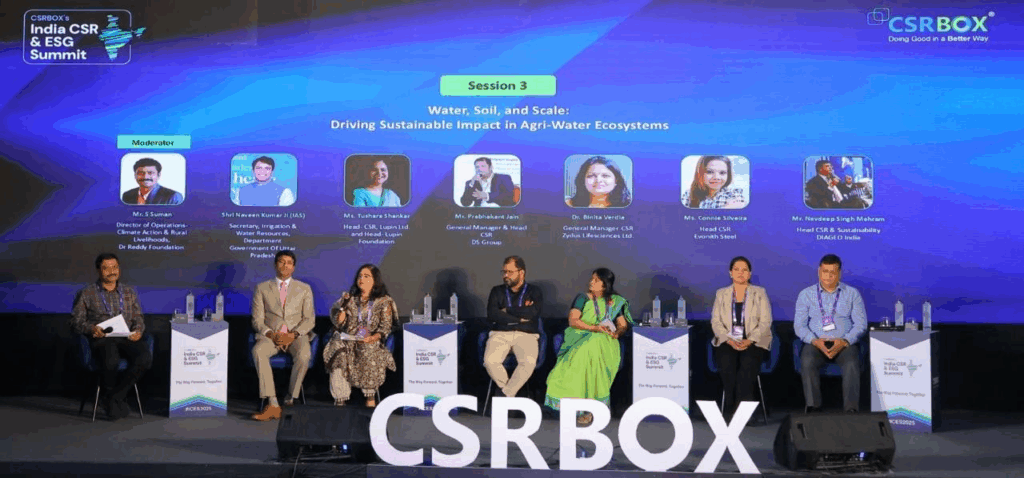Tushara Shankar leads Corporate Social Responsibility (CSR) at Lupin Limited, a global pharmaceutical company dedicated to improving lives through accessible healthcare.
As Head of Lupin Human Welfare & Research Foundation (LHWRF), she steers CSR efforts focusing on sustainable healthcare and economic empowerment across India’s underserved communities.
With nearly two decades of experience spanning NGOs, corporates, and government programs, Tushara’s journey reflects evolving commitment and expertise in rural upliftment, women empowerment, and health system strengthening.
Lupin Foundation, under her guidance, works in over 5000 villages, recently signing a landmark MoU with Rajasthan’s government to address cardiovascular and respiratory diseases through community-based interventions and healthcare worker training.
“It takes commitment and vision to solve real-world problems,” she says, underscoring the Foundation’s mission to create lasting community impact by combining livelihoods with lives. This approach engages multiple stakeholders from government officials to local artisans in a united goal to uplift rural India.

A Career Built on Purpose and Impact
Tushara Shankar’s journey began after completing her Master’s in Social Work from Tata Institute of Social Sciences (TISS), Mumbai, specialising in Urban and Rural Community Development.
She brought her knowledge to practical action by managing rural health programs, including the launch of the National Rural Health Mission (NRHM) in Jharkhand, a government-corporate collaborative initiative to improve rural healthcare infrastructure.
Over the years, she has worked with multiple organizations, including ORBIS International, Catalyst Management Services, Reckitt Benckiser, and United Breweries, honing her expertise in program development, evaluation, and cross-sector partnerships.
“One cannot thrive without the other health and livelihoods must go hand in hand,” she often says, underscoring her integrated approach that recognises poverty and health as intertwined challenges best addressed through holistic solutions.
Her leadership style embraces collaboration, evidence-driven strategy, and community engagement, steering CSR away from mere philanthropy towards systemic change.

Strategic Leadership at Lupin Foundation
Since joining Lupin in 2021, Tushara has spearheaded a transformation within the Lupin Foundation to prioritize ‘Lives and Livelihoods’ two complementary pillars that underpin the organisation’s programmes.
The Foundation operates in key districts such as Bharatpur and Alwar in Rajasthan, as well as Palghar and Pune in Maharashtra, with outreach extending to 1.3 million households across India.
Healthcare initiatives have received renewed focus with programs targeting non-communicable diseases (NCDs) like cardiovascular ailments and chronic obstructive pulmonary disease (COPD), which pose severe public health risks in rural areas.
Under Tushara’s direction, over 60 senior medical officers have been trained on updated clinical guidelines, enabling better diagnosis, management, and referral systems for these conditions.
Health camps, community mobilization, and establishment of NCD-specific health corners at primary care centres have been integral to this approach.
Parallelly, Lupin Foundation’s livelihood programs empower disadvantaged groups artisans, landless farmers, small and marginal cultivators by promoting non-farm vocations such as beekeeping, pottery, and gemstone polishing. These activities diversify income, reduce economic vulnerability, and improve women’s financial independence.

Community-Led Development Pillars
Lupin Foundation adopts an ecosystem approach addressing four thematic areas: Economic Development, Social Development, Infrastructure, and Natural Resource Management. This comprehensive model aligns corporate responsibility with community needs and governmental priorities.
Economic initiatives span agriculture, animal husbandry, rural industries, and women empowerment, supported by community-based organisations and self-help groups to ensure local leadership and sustainability.
Social programs focus on health, education, sanitation, and disaster relief, recognising that social well-being boosts economic prospects.
For instance, Rukmini, a beneficiary from one village, transitioned from subsistence farming to commercial poultry and vegetable cultivation, improving household income and food security. Stories like hers exemplify the tangible benefits of Lupin Foundation’s integrated interventions.

Government Collaboration Amplifies Impact
Tushara’s recent collaboration with Rajasthan’s Department of Medical, Health and Family Welfare signifies a significant step in scaling impact through public-private partnerships.
Dr. K L Meena, Director of Public Health in Rajasthan, noted, “This program addresses critical gaps in healthcare infrastructure and awareness through the establishment of specialised NCD care units in Alwar.”
The collaboration includes training healthcare providers, setting up screening mechanisms, enhancing diagnostic services, and continuous patient health tracking via digital tools.
These interventions are expected to drastically improve early diagnosis and treatment adherence, reducing disease burden and healthcare costs for rural families.
The Logical Indian’s Perspective
Tushara Shankar’s journey is a testament to the potential of corporate social responsibility when aligned with empathy, collaboration, and strategic planning. The Logical Indian believes that her integrative approach, combining healthcare and livelihoods, reflects the path toward reducing inequalities and fostering social harmony.
Such models inspire reflection on the roles and responsibilities of corporations in nation building and poverty alleviation. How can more companies embrace such comprehensive, empathic CSR approaches? What mechanisms can governments and civil society enact to support the scaling and replication of initiatives like those led by Lupin Foundation?
If you’d like us to cover your story or feature your initiative, please write to us at csr@5w1h.media.











